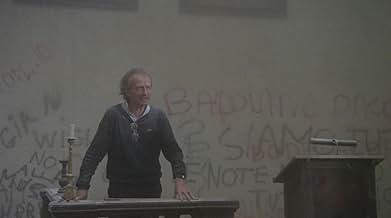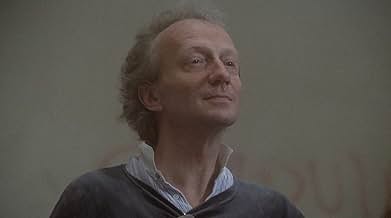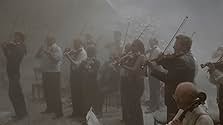NOTE IMDb
7,1/10
5,4 k
MA NOTE
Un orchestre se réunit pour une répétition dans une ancienne chapelle sous les yeux inquisiteurs d'une équipe de télévision, mais un soulèvement éclate.Un orchestre se réunit pour une répétition dans une ancienne chapelle sous les yeux inquisiteurs d'une équipe de télévision, mais un soulèvement éclate.Un orchestre se réunit pour une répétition dans une ancienne chapelle sous les yeux inquisiteurs d'une équipe de télévision, mais un soulèvement éclate.
- Réalisation
- Scénario
- Casting principal
- Récompenses
- 1 victoire et 2 nominations au total
Nando Villella
- Cello player
- (as Ferdinando Villella)
Franco Javarone
- Bass tuba player
- (as Giovanni Javarone)
Andrew Lord Miller
- Oboe player
- (as Andy MIller)
Cesare Martignoni
- Clarinet player
- (as Cesare Martignon)
Filippo Trincia
- Head of orchestra
- (as Filippo Trincaia)
Avis à la une
In most of Federico Fellini's best films, he made big statements about the way we live and socialize with each other and deal with ourselves as much as the past, all within exciting, tragic-comic film-making style. Orchestra Rehearsal does the same, though in a shorter amount of time. We are given a (union) orchestra in Italy, who's members vary from young adults to the old timers, women, introverts, trouble makers, and so forth, who each have their own music of choice (or sometimes of necessity). The conductor is frustrated- he can barely get the orchestra to concentrate much less really practice, and the union problems get things caught in the way as they rip through the ironically happy and (typically) carnival-like pieces. There's a break taken, which is when everything starts to slowly, but surely, wind down and breakdown among the musicians. In the meantime a television crew stands by taking 'interviews' of the musicians, their opinions, their little 'off' moments, signaling the anarchy that will soon ensue.
The interviews themselves are some of the strongest, funniest parts of the film- the interviewers get (sometimes begrudgingly) words on their instruments, why they play, how they play, and what role their music has in the world. These interviews can also be hit-or-miss sometimes, and because of the constant dialog (there's sometimes barely a breath to be had, as is the beautiful claustrophobic style in Fellini's characters), there's almost too much information going on. There's also the tendency for the character(s), whom are mostly portrayed by un-professionals (to acting, not to music of course), to not be very convincing, or even a little boring (the conductor's monologue in his room, for example, is one of the weaker parts of the film for me). But then it does start to pick up in insane, trademark Fellini fashion as the musicians rebel, and an unexpected surprise comes heading their way.
It's likely that Orchestra Rehearsal isn't one of Fellini's very best films, but it is one that captivates as it bemuses, brings laughs as it does thought, and it isn't necessarily a wasteful experience (some may not like it much at all, at least in comparison to his masterpieces). Not to forget the incalculable, lasting power of Nina Rota's music, which drives the film's bombastic, heart-racing rehearsing scenes (there is also humor underneath much of the music, like when the musicians have their own little solos as jokes). There's something always satisfying when a composer is on the same page as the director he's writing for, and few were ever so in tune as Fellini and Rota. And even during some parts that don't add up, their combination helps out a lot. As mentioned before, one could even think deeper into the ideas and thoughts and characters in the film as almost a microcosm of society itself, its easy-going people, its hard-nosed people, its incendiaries, its nostalgics, and its normals and eccentrics. Or, one can just take the Fellini ride, so to speak, and enjoy some 70 minutes with Fellini & company.
The interviews themselves are some of the strongest, funniest parts of the film- the interviewers get (sometimes begrudgingly) words on their instruments, why they play, how they play, and what role their music has in the world. These interviews can also be hit-or-miss sometimes, and because of the constant dialog (there's sometimes barely a breath to be had, as is the beautiful claustrophobic style in Fellini's characters), there's almost too much information going on. There's also the tendency for the character(s), whom are mostly portrayed by un-professionals (to acting, not to music of course), to not be very convincing, or even a little boring (the conductor's monologue in his room, for example, is one of the weaker parts of the film for me). But then it does start to pick up in insane, trademark Fellini fashion as the musicians rebel, and an unexpected surprise comes heading their way.
It's likely that Orchestra Rehearsal isn't one of Fellini's very best films, but it is one that captivates as it bemuses, brings laughs as it does thought, and it isn't necessarily a wasteful experience (some may not like it much at all, at least in comparison to his masterpieces). Not to forget the incalculable, lasting power of Nina Rota's music, which drives the film's bombastic, heart-racing rehearsing scenes (there is also humor underneath much of the music, like when the musicians have their own little solos as jokes). There's something always satisfying when a composer is on the same page as the director he's writing for, and few were ever so in tune as Fellini and Rota. And even during some parts that don't add up, their combination helps out a lot. As mentioned before, one could even think deeper into the ideas and thoughts and characters in the film as almost a microcosm of society itself, its easy-going people, its hard-nosed people, its incendiaries, its nostalgics, and its normals and eccentrics. Or, one can just take the Fellini ride, so to speak, and enjoy some 70 minutes with Fellini & company.
Perhaps not your usual Fellini film, if there is such a thing, but, made between his Casanova (1976) and City of Women (1980), this is an intriguing if rather short and enigmatic piece. Ostensibly a documentary but almost as soon as the musicians begin turning up, all does not seem to be quite as expected. Has the director really found an orchestra with so many oddball characters? Is the German conductor a fascist dictator in disguise? Are the proceedings really to be monitored by a trade union shop steward? Is this more a comment upon Italian politics of the time than a showcase for music? All may be revealed to each upon his or her own viewing and interpretation but for me it is a brave and amusing piece that perhaps loses a fair bit without awareness of the considerable turmoil within Italy at the time. One of the most interesting elements happens to be that Nino Rota wrote the music that is rehearsed and then performed within the film and that it was one of the last things he did before dying the following year, having scored around 150 films including almost every single one for Federico Fellini.
Some fully creditable critics deemed "Prova d'orchestra" as being Fellini's main masterpiece. Although recognizing their slight exaggeration, I still can fully empathize with their point. The movie is one of the most intelligent, stylish and personal instances of the much used (and abused) recipe of the "social microcosm". Of course, Fellini's trick to build up a parable of society by using the orchestra parallel is not only original, but also very efficient: the metaphors and symbols resulting from this are both powerful and humorous, in an atrociously satyric vein.
Also, it's very interesting to note the gradual glissando from realism to hyperbole, and from cold detachment to paranoid hysteria; as such, what started as a pseudo-documentary, impartial and technical, gradually turns into a major pandemonium, to culminate with the hallucinatory profiling of the demolition iron ball, as an omen of doom - that being the point where the artist really meets the divine, both as meaning, and as means.
One should also notice the masterfully style of shooting the orchestra, the people and the instruments, to build up the cinematographic symphony layered over the musical one, and to create that irresistibly fast-paced narrative in images, that makes the movie so exciting and captivating - it's literally to be watched on the edge on your seat, although nothing more spectacular happens than an orchestra rehearsing in a disaffected church... all being the result of Fellini's skillful cinematography.
At last, one couldn't depart any reference to this masterpiece without mentioning at least in passing the haunting finale. Although I always regarded with political objectivity and historical honesty the national-socialist ideology, goals and means, I must confess that I fully assimilate Fellini's powerful warning about any dictatorial excesses. Balduin Bass' voice rising in a Hitlerian monologue is an efficient and pointed mean of expression and style - and his last line after fade out, "Signori... Da capo!", indeed MAKES A POINT!
Also, it's very interesting to note the gradual glissando from realism to hyperbole, and from cold detachment to paranoid hysteria; as such, what started as a pseudo-documentary, impartial and technical, gradually turns into a major pandemonium, to culminate with the hallucinatory profiling of the demolition iron ball, as an omen of doom - that being the point where the artist really meets the divine, both as meaning, and as means.
One should also notice the masterfully style of shooting the orchestra, the people and the instruments, to build up the cinematographic symphony layered over the musical one, and to create that irresistibly fast-paced narrative in images, that makes the movie so exciting and captivating - it's literally to be watched on the edge on your seat, although nothing more spectacular happens than an orchestra rehearsing in a disaffected church... all being the result of Fellini's skillful cinematography.
At last, one couldn't depart any reference to this masterpiece without mentioning at least in passing the haunting finale. Although I always regarded with political objectivity and historical honesty the national-socialist ideology, goals and means, I must confess that I fully assimilate Fellini's powerful warning about any dictatorial excesses. Balduin Bass' voice rising in a Hitlerian monologue is an efficient and pointed mean of expression and style - and his last line after fade out, "Signori... Da capo!", indeed MAKES A POINT!
It is rather neglected a movie by Fellini, but I agree with those who see it as a 'metaphor' of the Italian society; not of the Italian society in general, but of the Italian society at the end of the '70s. After 1968, there was turmoil in the country and the artist's message is quite clear, apparently: prolonged social strife can lead to dictatorial outcomes. The message is not so clear at the beginning of the film and it might be seen as a sort of a 'documentary', but when that huge stone 'ball' starts pounding on the building where the 'orchestra' are rehearsing and a faraway voice starts becoming more and more clear and strong, Fellini's message becomes obvious.
10Ymir4
This is likely the finest make-believe documentary that I have ever seen. The setting is a rundown Medieval Roman chapel, now an oratorio where an orchestra gathers. A television crew is making a documentary about this orchestra (while the orchestra is dealing with a union dispute). The bulk of the film's first half focuses on individual musicians, many of whom reminisce about their first encounter with the instrument they play. When the musicians talk about their instrument, they often share thoughtful and stimulating metaphors about the meaning and the function of their instrument. There are a few times during the film where the action is interrupted by a large rumble in the building. We don't know what this is exactly until the end of the film. The film transforms from poetic, to pure comical delight, to complete chaos, to lyrical beauty when the musicians play the music.
Composer Nino Rota's contribution was an immense one. He composed all of the pieces the musicians play in the film, and I believe they the music is absolutely wonderful (my personal favorite of Rota's compositions for "Orchestra Rehearsal" being the final piece the orchestra performs). This was the last time Rota scored a Fellini film, he died the next year.
I also must comment on the top-notch cinematography, which is quintessentially Felliniesque (ex. incredible long shots of the orchestra playing, shots of musicians lined up in very particular angles, and a couple of sweeping pans).
Anybody who loves orchestral music will like this film to some degree. I happen to immensely love Fellini, Rota, AND orchestral music, so for me, this film is nothing short of absolutely marvelous entertainment!
Composer Nino Rota's contribution was an immense one. He composed all of the pieces the musicians play in the film, and I believe they the music is absolutely wonderful (my personal favorite of Rota's compositions for "Orchestra Rehearsal" being the final piece the orchestra performs). This was the last time Rota scored a Fellini film, he died the next year.
I also must comment on the top-notch cinematography, which is quintessentially Felliniesque (ex. incredible long shots of the orchestra playing, shots of musicians lined up in very particular angles, and a couple of sweeping pans).
Anybody who loves orchestral music will like this film to some degree. I happen to immensely love Fellini, Rota, AND orchestral music, so for me, this film is nothing short of absolutely marvelous entertainment!
Le saviez-vous
- GaffesWhen they are interviewing the first violinists, the harpist in the background is clearly not playing but harp music is audible.
- ConnexionsFeatured in In Search of Fellini (2017)
Meilleurs choix
Connectez-vous pour évaluer et suivre la liste de favoris afin de recevoir des recommandations personnalisées
- How long is Orchestra Rehearsal?Alimenté par Alexa
Détails
- Date de sortie
- Pays d’origine
- Langues
- Aussi connu sous le nom de
- Orchestra Rehearsal
- Lieux de tournage
- Sociétés de production
- Voir plus de crédits d'entreprise sur IMDbPro
- Durée1 heure 12 minutes
- Mixage
- Rapport de forme
- 1.37 : 1
Contribuer à cette page
Suggérer une modification ou ajouter du contenu manquant

Lacune principale
By what name was Répétition d'orchestre (1978) officially released in India in English?
Répondre


























